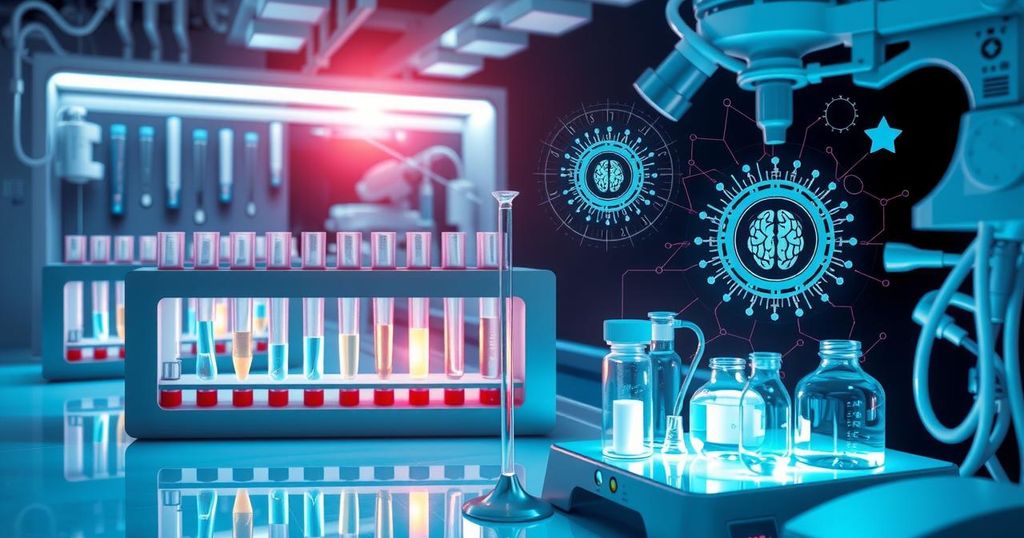The global healthcare AI market is set to reach $102.7 billion by 2028, emphasizing the importance for Nigeria to adopt AI-driven diagnostic solutions. The country must foster advancements in healthcare infrastructure, professional training, and data protection to harness AI’s full potential. Establishing AI diagnostic startups and developing tailored health-tech devices are viable opportunities that could drive economic growth while improving healthcare services.
The global healthcare AI market is projected to reach an impressive $102.7 billion by 2028, significantly impacting medical diagnostics. Nigeria must evaluate its position in capturing this burgeoning market: the choice lies between continuing to import costly diagnostic services or developing homegrown AI-powered solutions that meet local needs.
Nigeria’s healthcare history began with traditional remedies and community care, evolving through colonial influences that introduced structured healthcare and public health services. Despite advancements and the presence of diagnostic labs in urban and some rural areas, Nigeria still falls short of international best practices.
By 2025, reliance on human interpretation for diagnostics will be outdated. Countries embracing AI are already experiencing the benefits of faster and more accurate diagnostics, as AI is now integral to hospitals and laboratories. Nigeria must act swiftly to adopt these technologies or risk falling behind.
AI innovations in Imaging and Radiology, like Google’s DeepMind and PathAI, provide advanced analyses of medical imaging faster than human radiologists. In Predictive Diagnostics, AI can identify risks for diseases before they manifest. Furthermore, Histopathology has seen improvements with AI tools that analyze samples rapidly, enhancing accuracy.
Point-of-Care AI Diagnostics exemplifies innovation, offering handheld devices capable of performing tests near patients, including in remote areas. The future of diagnostics will see automated labs and AI as integral assistants for healthcare professionals, leading to personalized medicine through AI’s ability to match therapies with genetic profiles.
PwC estimates AI’s potential contribution to the global economy could reach $15.7 trillion by 2030, with healthcare as a primary beneficiary. Nigeria needs to seize this chance to avoid falling behind as healthcare becomes increasingly driven by technology.
However, Nigeria’s healthcare infrastructure faces challenges, including unreliable power supply and inadequate internet connectivity, hindering AI integration. Additionally, healthcare professionals may lack the necessary training to use AI effectively in diagnostics.
This situation presents a significant opportunity for Nigeria to leap ahead by adopting AI-powered diagnostics swiftly rather than gradually. Immediate steps are required to ensure successful AI implementation, particularly in enhancing infrastructure, education, and data protection laws.
Harnessing AI in diagnostics should be viewed as a lucrative business prospect rather than merely a technological upgrade. Opportunities exist for entrepreneurs to establish AI diagnostic startups, develop AI health-tech devices, and create training programs for medical professionals.
Venture capitalists and investors should recognize Nigeria’s ripe health-tech environment, which is poised for growth as AI solutions cater to both local and regional needs. AI in diagnostics is not just a trend but a critical evolution in healthcare that can drive economic growth and enhance public health in Nigeria.
To remain relevant in the modern world, Nigeria must embrace AI in healthcare, aiming to reduce errors, expedite diagnoses, and make healthcare accessible and affordable. This revolution must commence immediately, or the consequences may be dire for both financial and health outcomes.
In summary, the integration of AI into Nigeria’s healthcare diagnostics is imperative for the country’s advancement. Significant investment in infrastructure, training, and data protection is necessary to facilitate this transition. The opportunity for innovation and economic growth is immense, and by seizing this moment, Nigeria can vastly improve its healthcare outcomes and competitive position in the global market.
Original Source: businessday.ng






